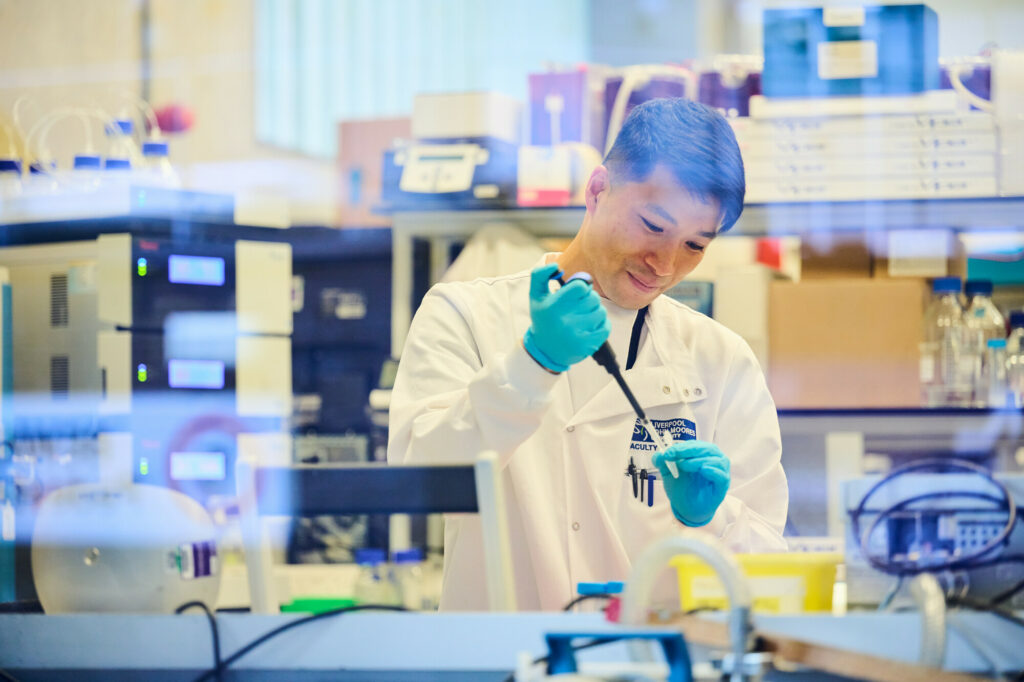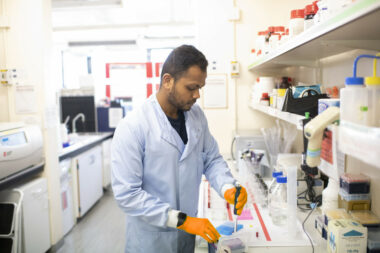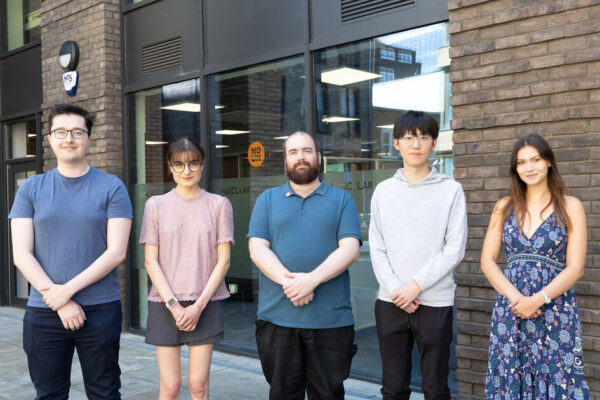We’re delighted to announce we’re investing £1.7 million into 12 new research projects as part of our 2024 grant round. We fund research that aims to improve diagnosis, monitor progression, and develop and test potential new treatments for muscle wasting and weakening conditions. This brings the total number of research projects we fund to 51.
We’re investing £1.7m into new research

Funding a range of conditions
Our new research projects cover a range of different conditions including desminopathy, periodic paralysis, Charcot-Marie-Tooth disease (CMT)/SORD neuropathy, Duchenne muscular dystrophy, mitochondrial myopathy, limb-girdle muscular dystrophies, myotonic dystrophy type 1, and facioscapulohumeral muscular dystrophy (FSHD).
Grant locations
The new research grants reach across England and Scotland with new funding awarded to researchers in Cambridge, Glasgow, London, Newcastle, Nottingham and Teesside.
Community involvement
Involving the community in research projects is vital. People with lived experience of muscle wasting conditions should be involved in research as much as possible. We’re pleased that several projects we’re funding from 2024 will involve people with a specific condition in their studies.
Expanding our research portfolio
Our Director of Research and Innovation Kate Adcock said: “Every year we look to fund the highest quality research that will not only bring research forward but also improve the lives of people living with muscle wasting and weakening conditions.
“We’re always delighted to fund research into a variety of conditions including those that we haven’t previously funded, or we haven’t funded for several years. This year is no exception, as we’ve seen an increasing number of conditions in our research portfolio, by funding research into periodic paralysis, CMT/SORD neuropathy and desminopathy.”
Our 2024 grants
Professor Rita Horvath and her team will test the use of a dietary supplement as a potential new treatment for people with mitochondrial myopathies.
Dr Jarod Wong will lead a study involving people living with muscle wasting conditions and healthcare workers to improve the accessibility and performance of bone density scanning to make monitoring weak bones more straightforward.
- Understanding how Duchene muscular dystrophy affects brain function, University College London (UCL)
Professor Patrizia Ferretti and her team will look at brain cells from people with Duchene muscular dystrophy in order to improve our understanding of how brain function is affected in people with this condition.
Professor Henry Houlden and colleagues from UCL (and Newcastle University) will use state-of-the-art DNA sequencing techniques to identify genetic causes of limb-girdle muscular dystrophies in families who have no genetic diagnosis.
Dr Roope Mannikko and his PhD student aim to develop a new gene therapy to help prevent muscle weakening in people with periodic paralysis.
Dr James Sleigh and colleagues will use a mouse model of SORD neuropathy to test potential gene therapies for this condition.
Professor Francesco Saverio Tedesco and his PhD student aim to understand if changes in the shape of nuclei in muscle cells of people with laminopathies cause the loss of organisation of DNA.
Dr Michael Keogh will be developing a new gene therapy for a type of myofibrillar myopathy called desminopathy. He will look to see if it’s harmful to muscle cells in laboratory settings.
Professor Giorgio Tasca and colleagues will study muscle cells from people living with FSHD to look at whether specific genes are switched on or off and where within the cells this is happening.
Professor Jordi Diaz-Manera and his team will enhance the diagnostic tool called MYO-Guide (already supported by MDUK), which brings together the power of magnetic resonance imaging (MRI) and artificial intelligence (AI), to diagnose even more conditions with high accuracy.
Dr Ami Ketley will use a new technique and computer analysis to look at different tissues in mice that have the same genetic information as people with myotonic dystrophy type 1 to understand what is exactly happening in the heart, brain and muscles.
Professor Linda Popplewell and her PhD student will apply a new gene editing technique to try and develop a therapy for people living with Duchenne muscular dystrophy. This potential therapy could be suitable for many people with DMD, unlike other potential treatments that target specific regions of the DMD gene.
We would like to thank our lay research panel and medical research committee for their time and expertise who help us with the selection and approval process of the research we fund.

We fund groundbreaking research to learn more about muscle wasting conditions and lead us to new treatments. We’ve already made advances that would have been unthinkable just 10 years ago, and we are determined to go even further and faster.

Your contribution today, in any form, extends beyond financial support—it’s a pledge to join us. Together we fund groundbreaking research and life changing support for everyone affected by muscle wasting conditions.

